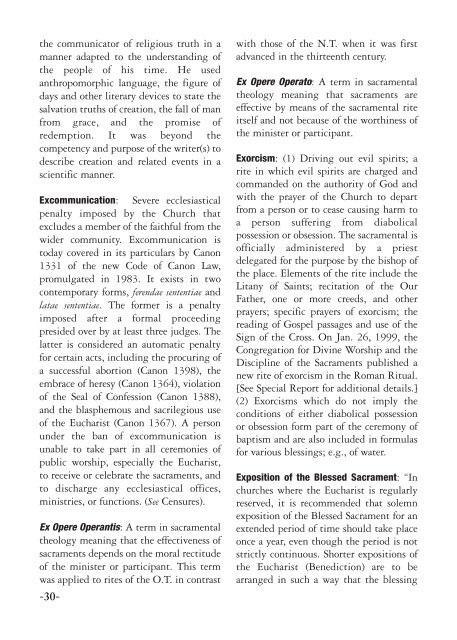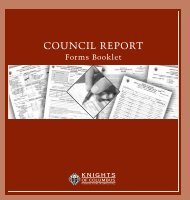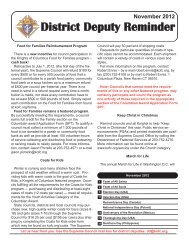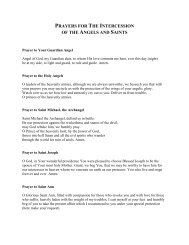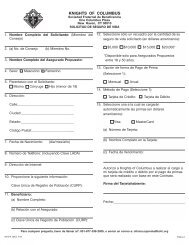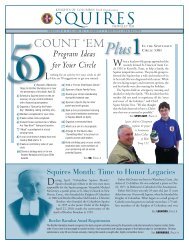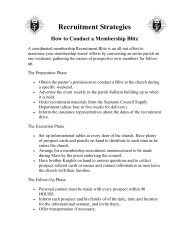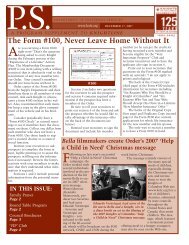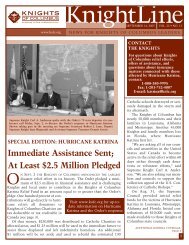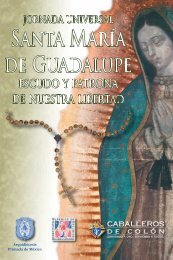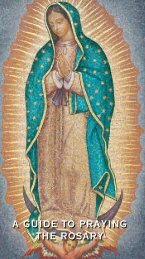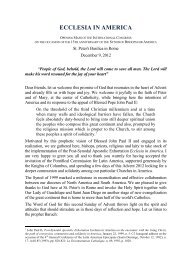CATHOLIC WORD BOOK - Knights of Columbus, Supreme Council
CATHOLIC WORD BOOK - Knights of Columbus, Supreme Council
CATHOLIC WORD BOOK - Knights of Columbus, Supreme Council
Create successful ePaper yourself
Turn your PDF publications into a flip-book with our unique Google optimized e-Paper software.
the communicator <strong>of</strong> religious truth in a<br />
manner adapted to the understanding <strong>of</strong><br />
the people <strong>of</strong> his time. He used<br />
anthropomorphic language, the figure <strong>of</strong><br />
days and other literary devices to state the<br />
salvation truths <strong>of</strong> creation, the fall <strong>of</strong> man<br />
from grace, and the promise <strong>of</strong><br />
redemption. It was beyond the<br />
competency and purpose <strong>of</strong> the writer(s) to<br />
describe creation and related events in a<br />
scientific manner.<br />
Excommunication: Severe ecclesiastical<br />
penalty imposed by the Church that<br />
excludes a member <strong>of</strong> the faithful from the<br />
wider community. Excommunication is<br />
today covered in its particulars by Canon<br />
1331 <strong>of</strong> the new Code <strong>of</strong> Canon Law,<br />
promulgated in 1983. It exists in two<br />
contemporary forms, ferendae sententiae and<br />
latae sententiae. The former is a penalty<br />
imposed after a formal proceeding<br />
presided over by at least three judges. The<br />
latter is considered an automatic penalty<br />
for certain acts, including the procuring <strong>of</strong><br />
a successful abortion (Canon 1398), the<br />
embrace <strong>of</strong> heresy (Canon 1364), violation<br />
<strong>of</strong> the Seal <strong>of</strong> Confession (Canon 1388),<br />
and the blasphemous and sacrilegious use<br />
<strong>of</strong> the Eucharist (Canon 1367). A person<br />
under the ban <strong>of</strong> excommunication is<br />
unable to take part in all ceremonies <strong>of</strong><br />
public worship, especially the Eucharist,<br />
to receive or celebrate the sacraments, and<br />
to discharge any ecclesiastical <strong>of</strong>fices,<br />
ministries, or functions. (See Censures).<br />
Ex Opere Operantis: A term in sacramental<br />
theology meaning that the effectiveness <strong>of</strong><br />
sacraments depends on the moral rectitude<br />
<strong>of</strong> the minister or participant. This term<br />
was applied to rites <strong>of</strong> the O.T. in contrast<br />
-30-<br />
with those <strong>of</strong> the N.T. when it was first<br />
advanced in the thirteenth century.<br />
Ex Opere Operato: A term in sacramental<br />
theology meaning that sacraments are<br />
effective by means <strong>of</strong> the sacramental rite<br />
itself and not because <strong>of</strong> the worthiness <strong>of</strong><br />
the minister or participant.<br />
Exorcism: (1) Driving out evil spirits; a<br />
rite in which evil spirits are charged and<br />
commanded on the authority <strong>of</strong> God and<br />
with the prayer <strong>of</strong> the Church to depart<br />
from a person or to cease causing harm to<br />
a person suffering from diabolical<br />
possession or obsession. The sacramental is<br />
<strong>of</strong>ficially administered by a priest<br />
delegated for the purpose by the bishop <strong>of</strong><br />
the place. Elements <strong>of</strong> the rite include the<br />
Litany <strong>of</strong> Saints; recitation <strong>of</strong> the Our<br />
Father, one or more creeds, and other<br />
prayers; specific prayers <strong>of</strong> exorcism; the<br />
reading <strong>of</strong> Gospel passages and use <strong>of</strong> the<br />
Sign <strong>of</strong> the Cross. On Jan. 26, 1999, the<br />
Congregation for Divine Worship and the<br />
Discipline <strong>of</strong> the Sacraments published a<br />
new rite <strong>of</strong> exorcism in the Roman Ritual.<br />
[See Special Report for additional details.]<br />
(2) Exorcisms which do not imply the<br />
conditions <strong>of</strong> either diabolical possession<br />
or obsession form part <strong>of</strong> the ceremony <strong>of</strong><br />
baptism and are also included in formulas<br />
for various blessings; e.g., <strong>of</strong> water.<br />
Exposition <strong>of</strong> the Blessed Sacrament: “In<br />
churches where the Eucharist is regularly<br />
reserved, it is recommended that solemn<br />
exposition <strong>of</strong> the Blessed Sacrament for an<br />
extended period <strong>of</strong> time should take place<br />
once a year, even though the period is not<br />
strictly continuous. Shorter expositions <strong>of</strong><br />
the Eucharist (Benediction) are to be<br />
arranged in such a way that the blessing


